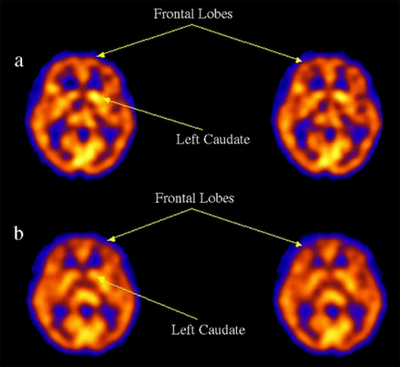Neuroscience

Talking Heads
Glossolalia, or speaking in tongues,
 SPECTacular Glossolalia (Newberg et al., 2006)
SPECTacular Glossolalia (Newberg et al., 2006)
The figure above illustrates the singing state (a) and the glossolalia state (b). The authors say there is decreased regional cerebral blood flow (rCBF) bilaterally in the frontal lobes and unilaterally in the left caudate, so we'll just have to take their word for it. BUT:
What does it mean? How does this compare to another neurotheology study, recollection of a mystical experience in Carmelite nuns (Beauregard & Paquette, 2006)? The one commonality is an increase in left SPL in both studies.
Can we really say She's Lost Control?
- Perspectives On Psychological Science: Blogs Don't Exist
The Seductive Allure of Neuroscience Explanations The previous post, Voodoo Correlations: Two Years Later, was a retrospective on the neuroimaging methods paper that was widely discussed in the blogosphere before it was considered "officially" published...
- "science Fiction, Science Fantasy"
Dr. Geoffry Aguirre of the University of Pennsylvania can has cortex? Of all places, the FaithWorld blog at Reuters has some excellent coverage of the ongoing Penn Neuroscience Boot Camp, An intensive summer institute for non-neuroscientists seeking...
- She's Found Control Over Zwei Sprachen: Left Caudate In Bilinguals
Previously, The Neurocritic speculated on the significance of reduced rCBF (regional cerebral blood flow) in the left caudate nucleus in a SPECT study of women speaking in tongues (Newberg et al., 2006). This speculation was based on a recent fMRI study...
- Neural Correlates Of A Mystical Experience In Carmelite Nuns
The title of this article by Beauregard and Paquette is a little misleading, because "God can’t be summoned at will." Beauregard M, Paquette V. (2006). Neural correlates of a mystical experience in Carmelite nuns. Neurosci Lett. Jul 25; [Epub ahead...
- Brain Scans And Lie Detection: True Or False?
Now this is a rapidly expanding area of research (and one that's quite well-funded by the DOD). Wired did a piece on this recently (Don't Even Think About Lying), and there's an AP story that appeared in papers around the country (e.g., the...
Neuroscience
Glossolalia

Talking Heads
Glossolalia, or speaking in tongues,
comprises the utterance of semantically meaningless syllables. Glossolalia is claimed by some to be an unknown mystical language; others claim that glossolalia is the speaking of an unlearned foreign language (see xenoglossia). Glossolalic utterances sometimes occur as part of religious worship (religious glossolalia).While occurrences of Glossolalia are widespread and well documented, there is considerable debate within religious communities (principally Christian) and elsewhere as to both its status - the extent to which glossolalic utterances can be considered to form language - and its source - whether glossolalia is a natural or supernatural Spiritual phenomenon.
A recent neuroimaging study (Newberg et al, 2006) was able to catch 5 religious women in the act of glossolalia while a SPECT (single photon emission computed tomography) scan measured the changes in their cerebral blow flow. SPECT is a relatively inexpensive cousin of PET scanning (positron emission tomography) with lower spatial resolution. One of the reasons fMRI was not a feasible technique for this study is that the amount of movement artifact produced by vigorous babbling would render the resultant images unusable.
Language Center Of The Brain Is Not Under The Control Of Subjects Who 'Speak In Tongues'The participants were screened for psychiatric conditions (other than speaking in tongues) and did not meet criteria for current Axis I or II disorders (American Psychiatric Association, 1994). Interestingly (and fittingly), the authors chose voluntary gospel singing as the control state for glossolalia. In contrast, speaking in tongues is an involuntary state over which the Charismatic or Pentecostal adherent has no control. The curious thing, however, is how the subjects were able to enter the state on cue:
. . .
Researchers at the University of Pennsylvania School of Medicine have discovered decreased activity in the frontal lobes, an area of the brain associated with being in control of one's self. This pioneering study, involving functional imaging of the brain while subjects were speaking in tongues, is in the November issue of Psychiatry Research: Neuroimaging...
Following the "singing" scan, the subject returned to the room to perform glossolalia. It began with the music playing and the person initially singing, and then relatively quickly entering into the glossolalia state (usually within 5 min). Once the subject was observed performing glossolalia for 5 min, she was unobtrusively injected with 25 mCi of 99mTc-ECD. The subject continued to perform glossolalia for 15 min and then the session was ended. The subject was then scanned ("glossolalia" scan) for 30 min using the same imaging parameters as above.The Neurocritic is not all that knowledgeable about SPECT as an imaging method, but these authors are (Committee on the Mathematics and Physics of Emerging Dynamic Biomedical Imaging, National Research Council), in case you're interested in learning more.
Newberg AB, Wintering NA, Morgan D, Waldman MR (2006). The measurement of regional cerebral blood flow during glossolalia: A preliminary SPECT study. Psychiatry Res. Oct 11; [Epub ahead of print]
Glossolalia (or "speaking in tongues") is an unusual mental state that has great personal and religious meaning. Glossolalia is experienced as a normal and expected behavior in religious prayer groups in which the individual appears to be speaking in an incomprehensible language. This is the first functional neuroimaging study to demonstrate changes in cerebral activity during glossolalia. The frontal lobes, parietal lobes, and left caudate were most affected.
 SPECTacular Glossolalia (Newberg et al., 2006)
SPECTacular Glossolalia (Newberg et al., 2006)The figure above illustrates the singing state (a) and the glossolalia state (b). The authors say there is decreased regional cerebral blood flow (rCBF) bilaterally in the frontal lobes and unilaterally in the left caudate, so we'll just have to take their word for it. BUT:
Our results were hypothesis driven so comparisons were only tested for the major structures of the frontal, temporal, and parietal lobes, as well as the amygdala, hippocampus, striatum, and thalamus, and thus a correction for multiple comparisons was not performed.I don't think that having a hypothesis exonerates one from correcting for multiple comparisons. [NOTE: right dorsolateral PFC and left caudate decreases would likely survive correction.] Anyway, the authors related the frontal rCBF decreases to the loss of volitional control that is experienced while speaking in tongues. The only healthy increase in rCBF was in the left superior parietal lobe (SPL). They predicted no change in the SPL.
What does it mean? How does this compare to another neurotheology study, recollection of a mystical experience in Carmelite nuns (Beauregard & Paquette, 2006)? The one commonality is an increase in left SPL in both studies.
Can we really say She's Lost Control?
- Perspectives On Psychological Science: Blogs Don't Exist
The Seductive Allure of Neuroscience Explanations The previous post, Voodoo Correlations: Two Years Later, was a retrospective on the neuroimaging methods paper that was widely discussed in the blogosphere before it was considered "officially" published...
- "science Fiction, Science Fantasy"
Dr. Geoffry Aguirre of the University of Pennsylvania can has cortex? Of all places, the FaithWorld blog at Reuters has some excellent coverage of the ongoing Penn Neuroscience Boot Camp, An intensive summer institute for non-neuroscientists seeking...
- She's Found Control Over Zwei Sprachen: Left Caudate In Bilinguals
Previously, The Neurocritic speculated on the significance of reduced rCBF (regional cerebral blood flow) in the left caudate nucleus in a SPECT study of women speaking in tongues (Newberg et al., 2006). This speculation was based on a recent fMRI study...
- Neural Correlates Of A Mystical Experience In Carmelite Nuns
The title of this article by Beauregard and Paquette is a little misleading, because "God can’t be summoned at will." Beauregard M, Paquette V. (2006). Neural correlates of a mystical experience in Carmelite nuns. Neurosci Lett. Jul 25; [Epub ahead...
- Brain Scans And Lie Detection: True Or False?
Now this is a rapidly expanding area of research (and one that's quite well-funded by the DOD). Wired did a piece on this recently (Don't Even Think About Lying), and there's an AP story that appeared in papers around the country (e.g., the...
